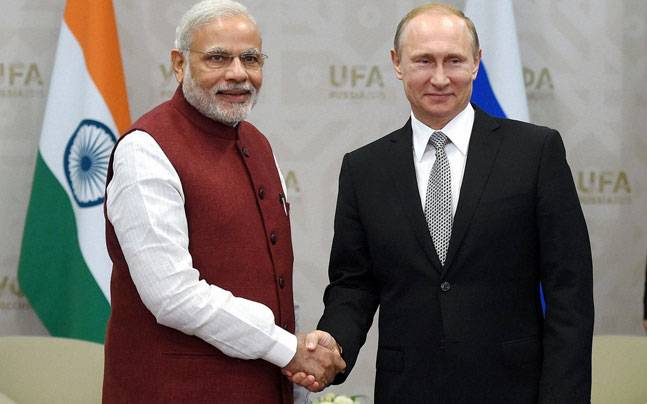Indian Prime Minister Narendra Modi and Russian President Vladimir Putin intend to discuss a proposed free trade agreement (FTA) between India and Russian-led Eurasian Economic Union (EAEU). This discussion will happen during a summit meeting that is to be held on June 1. There have been signs and rumours that India may oppose including e-commerce in this pact.
A joint feasibility study (JFS) group which recommended launching negotiations for the FTA advised that e-commerce should be included as a deliverable in the pact.
The Eurasian Economic Union comprising of Armenia, Belarus, Kazakhstan, and Kyrgyzstan has asked that e-commerce be included under the FTA under a new common legal framework. But India has put this on hold as it does not want to include market access elements as e-commerce laws and regulations are constantly evolving.
The JFS group, however, has suggested that if India were to switch from paper documents, there would be a definite increase in security as well as transparency in supply chains and this in turn will generate a higher revenue.
According to the report,
Such legal framework would increase trade, streamline business, bring element of certainty to cross-border commercial activities and allow to reduce delays and costs at the border. It is the driver in the modernization of administrations
The JFS has also advised that the EAEU and India should discuss matters including electronic authentication and digital signatures, private data protection, e-commerce participant protection, cross-border data flows, and use of electronic documents.
In light of India’s reluctance to include e-commerce, EAEU has pointed out that in its FTA with Vietnam, e-commerce issues are covered. This especially focuses on the mutual recognition of electron signatures and electronic documents. Despite this, India remains firm in saying that it won’t regulate itself with principles that can hurt the sovereign policy space and prevent further regulatory development. Therefore, it has decided to discuss only bilateral cooperation issues and the sharing of the best practices in e-commerce.
While India currently allows 100% foreign direct investment (FDI) in business-to-business e-commerce (B2B) activities, it does not allow the same for business-to-consumer (B2C) e-commerce.
Additionally, India has also turned down the offer to include market access negotiations on online trade at the multilateral level. In a statement, commerce minister Nirmala Sitharaman told reporters,
I am ready to join the talks, but it is not part of my agenda for the upcoming ministerial. Because every country is having a big churn in e-commerce and technology is fast-moving. A final understanding on the matter is yet to be reached. Therefore, it will not be proper to regulate or define e-commerce at present
This statement came after meeting with the chief of the WTO (World Trade Organization), Roberto Azevedo.
The reason India is refusing to engage in e-commerce talks is the lack of domestic consensus on the subject, although it is aware of the increasing importance of online trade. This is illustrated in the following example. Suppose the department of telecom wants to restrict server locations of global e-commerce companies to India only, the ministry of electronics and information technology, as well as the industry department and finance ministry will be opposed to this.
In 1998, the Declaration on Global Electronic Commerce was adopted by the WTO’s Second Ministerial Conference. This declaration urged members of the WTO to create a complete work program to examine issues that rise from global e-commerce. Ministers also agreed to hold off imposing customs duties on electronic transmissions until their next session.
This has continued to be upheld at subsequent ministerial conferences including the latest meeting in Nairobi in 2015. While the US wants to make this a permanent change, India plans to oppose it at the Argentina ministerial meeting in December 2017.
The Tech Portal is published by Blue Box Media Private Limited. Our investors have no influence over our reporting. Read our full Ownership and Funding Disclosure →






